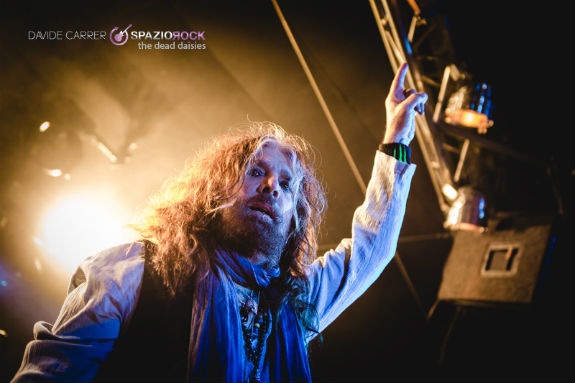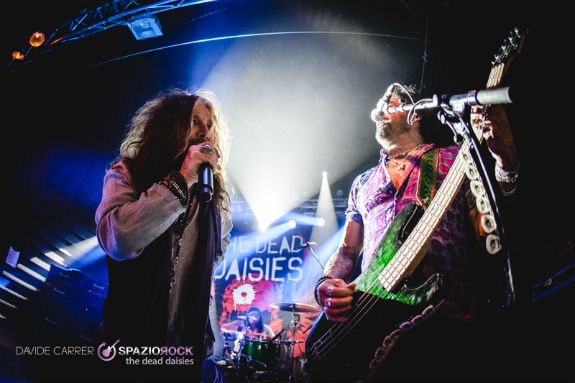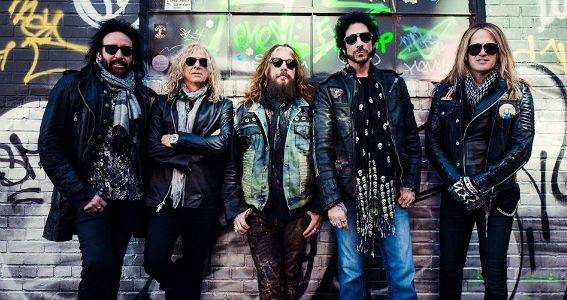SCROLL DOWN FOR ENGLISH VERSION
---ITA---
Domani uscirà il vostro nuovo album che ho già avuto il piacere di ascoltare in anteprima. La prima sensazione è che il vostro sound sia molto più duro e aggressivo del solito.
E' curioso perché non pianifichiamo nulla realmente. Siamo solo entrati in studio per iniziare a scrivere e per qualche strana ragione tutti avevano dei riff più aggressivi. Abbiamo lavorato sulle idee che venivano fuori dalle jam per poi registrarle, lasciando che fosse la musica a guidarci. Tutti noi siamo entusiasti della direzione intrapresa.
Da quale canzone siete partiti per arrivare a tutto il resto?
Credo che la prima su cui abbia cantato sia "Dead And Gone". Solitamente funziona che ognuno arriva in studio col telefono o il registratore sottoponendo agli altri i propri riff. Quando uno ci piace iniziamo a lavorare sullo schema, ovvero su delle idee approssimative delle canzoni. Da 15 o 20 di queste tiriamo fuori dalle 10 alle 15 che ci piacciono veramente per poi registrarle. E mentre lo facciamo continuiamo a cambiare le parti cercando di renderle ancora migliori, io stesso le riascolto e provo più melodie. Una volta stabilito come devono suonare le canzoni inizio a scrivere i testi. A volte me ne occupo da solo, altre insieme a Marti Frederiksen o ad altri collaboratori. Il nostro processo generale di scrittura è molto veloce, per questo disco ci abbiamo messo poco più di sei settimane.
Hai fatto riferimento ai testi, c'è un significato particolare dietro il titolo dell'album?
Eravamo alla ricerca di un titolo dopo aver completato tutte le canzoni. Semplicemente qualcuno ha detto "perché non lo chiamiamo Burn It Down?" ed è piaciuto al nostro management che si è occupato di farne realizzare la copertina. E' solo il titolo di una delle canzoni, niente più.
Quanto sono importanti i testi in una band come i Dead Daisies? La politica o l'attualità sono degli input quando è il momento di buttare giù le parole?
In tutta onestà quando scrivo vado molto sulla sfera personale: una persona con cui mi sono arrabbiato in passato, una ragazza con cui sono uscito o semplicemente spunti di vita. Altre volte prendo spunto dalle notizie sui media, come in "What Goes Around". "Resurrected" parla invece del periodo in cui ero nei Motley Crue e le cose iniziarono a prendere una brutta piega. Molte persone pensavano che fossi spacciato, ma, come dico nella canzone, "sono stato in piedi, sono stato triste, sono stato sbattuto fuori, ma sono ancora qui guardando avanti".
Credi che il retaggio musicale di Nashville possa aver in qualche modo influenzato il nuovo disco?
No non penso, in realtà riflette la musica degli artisti che ascoltiamo: ci sono canzoni che suonano come gli AC/DC, altre piuttosto come i Black Sabbath. Amiamo Nashville, io stesso ci vivo, ma la ragione per cui il disco è stato registrato qui è che ci piace lavorare con Marti e lui si sente più a suo agio nel suo studio. Inoltre costa di meno che realizzarlo a new York, Los Angeles o Sydney. Nashville non ha nulla a che fare col sound, sono le band con cui siamo cresciuti ad averci influenzato.
Qual è stato il contributo di Marti per queste canzoni? Che tipo di ruolo ha nella band?
Ha una grossa influenza senza dubbio, oltre ad essere un grande produttore è anche un grande autore. Se guardi indietro a band come Aerosmith, Queen, Alice Cooper, The Beatles... tutte loro hanno avuto un produttore per molti album. E' come avere un altro membro nella band: lo è stato Jack Douglas per gli Aerosmith, Bob Ezrin per Alice Cooper o Roy Thomas Baker per i Queen. E Marti lo è per noi. Sai, lui ha scritto "Jaded" insieme a Steven Tyler. E' fantastico lavorare con uno come lui, quando finiamo di registrare una canzone e dice "è molto figa, ma se la modificassimo così suonerebbe ancora meglio" ha ragione 9 volte su 10.
Il tuo approccio alla registrazione di un album è sempre lo stesso o è cambiato qualcosa nel corso degli anni?
Per molti dischi che ho realizzato in passato, come è capitato con gli Scream, una volta ottenuto il contratto discografico ci era concesso il lusso di chiuderci una stanza a scrivere per un anno. Stessa cosa nei Motley Crue, abbiamo impiegato un anno per scrivere il disco omonimo. E' andata così anche con l'album degli Union, io e Bruce (Kulick, chitarrista dei Kiss) ci abbiamo messo quel tempo lì. Quindi una volta che si entrava in studio le canzoni erano già pronte. Con i Dead Daisies è diverso, è più semplice e onesto perché il nostro pensiero iniziale è quello che solitamente finisce su disco. Ci sono volute solo quattro settimane per registrare "Revolucion", cinque per "
Make Some Noise", per "Burn It Down" sei. Non vogliamo sprecare tempo e denaro, facciamo quello che serve.
L'Italia rientra nel prossimo tour europeo (il 5 maggio a Milano). Qual è la cosa più strana che ti è capitato di sentire dai fan italiani?
Mi dicono sempre "sei italiano, allora perché non parli italiano?". In realtà sto cercando di impararlo, ho anche un programma sul computer per migliorarmi.
Di che parti sei originario esattamente?
I miei nonni venivano dal profondo sud: mia nonna era calabrese, di mio nonno non sono sicuro ma era calabrese o siciliano. Mi piacerebbe visitare la mia terra d'origine e parlare con le persone nella loro lingua.
Dovresti, anche Steven Tyler è originario della Calabria. Qualche anno fa è andato a trovare i suoi parenti lì.
Sarebbe grandioso. Non sono mai stato più giù di Roma, spero un giorno di poter vedere dove sono nati i miei nonni.
Lo scorso anno vi siete esibiti in Polonia con un'intera orchestra. Dobbiamo considerarlo solo un esperimento isolato?
Si è parlato della possibilità di fare qualche altro concerto tipo in Australia. Ma sai, è molto complicato muovere tutte quelle persone, solo nell'orchestra erano 60. E' difficile ma mi piacerebbe davvero molto farlo di nuovo.
Solo 3 band nella storia di Cuba hanno avuto la possibilità di suonare nell'isola: gli Audioslave, i Rolling Stones e i Dead Daisies. Cosa ti è piaciuto di più di quella esperienza?
Tornando indietro è stata semplicemente incredibile. I fan erano in delirio, arrivavano da tutte le parti dell'isola per vederci. Al tempo stesso è stata particolare... Cuba è anche un paese molto povero, capisci cosa intendo? Sicuramente mi piacerebbe tornare e suonare ancora lì ma non credo sia facile ora. Obama aveva avvicinato i due paesi, con Trump si sta andando nella direzione opposta.
Da poco hai pubblicato "Live '94: One night in Nashville", riproponendo il disco omonimo dei Motley Crue per intero. Perché hai voluto celebrarlo oggi?
In quel periodo con i Motley siamo stati tour per soli 3 mesi in America e ci sono tantissimi posti dove non abbiamo mai suonato. Molti fan non hanno avuto la possibilità di ascoltare quel materiale dal vivo, e per qualche strana ragione è come se quel disco non esistesse nel catalogo dei Motley Crue. Quando è stato il suo 20° anniversario, mentre ero in tour, ho fatto qualche show in cui ho pensato di suonarlo tutto. Sapevo che questa cosa sarebbe finita presto, così ho deciso di registrare un concerto nella speranza di pubblicarlo per far sentire alle persone come avrebbe suonato quell'album dal vivo. Sfortunatamente ogni volta che volevo farlo i Dead Daisies erano pronti con un nuovo disco, quindi ho dovuto aspettare un po'. Sono molto soddisfatto del risultato finale, Michael Wagener ha fatto un lavoro grandioso al mix. La cosa divertente è che adesso "Motely Crue" è ricomparso nelle classifiche di Billboard.
---ENGLISH VERSION---
I had the pleasure to listen to the new record before its official release. My first impression is that the sound is much more aggressive than you usually did in the past.
It's really weird, we don't really plan on anything but just got into the studio, started writing and for some reasons everybody had more aggressive riffs. We jammed, worked some things out and just started recording. We let the music take us where it wanted to go, all of us really love the direction the band is going in.
Which were the first songs you were working on? How does usually songwriting process work for The Dead Daisies?
I think the first that I sang was "Dead And Gone". But as far as writing we usually go into the studio, we just have some riffs, ideas and everybody comes in with their phone, tape recorder, playing the riffs... the one that everybody says "oh that's cool" we start working on and we get a map, like just the loose idea of the song. Maybe we get 15 or 20 loose ideas and we pick 10 to 15 that we really dig. We start tracking those songs and then, when doing it, we're still changing parts, trying to make them better. I'm listening and throwing different melodies while we're tracking the music. Once we get a pretty good idea of what the song's gonna sound like, then I go... sometimes I write lyrics by myself, sometimes with Marti and all the guys we all helped out with lyrics. It's a kind of a cool process, it's really fast. We did this record maybe in six and a half weeks.
You mentioned the lyrics, is there a meaning beyond the new record's title?
We were trying to think of an album title and after we had all the songs done, all the titles made and all the lyrics written somebody just said "what about call the record Burn It Down?". Our management said it was pretty cool, so they designed an album cover for it and everybody seemed to like it, but it's just one of our song's title.
How much important are lyrics in a band like The Dead Daisies? I mean: do politics or the state of the world have any sense to you when it's time to put down the words?
Honestly, when I write it's very personal: it may be a song about somebody that made me angry in the past, a girl that I used to date or just life. Sometimes it's about something I see on the news, like in "What Goes Around". "Resurrected" is very much about me when I was in Motley Crue and then kinks bad, a lot of people thought I was "no way", I was kind of written off. The song says "I've been up, I've been down, I've been kicked, but I'm still here moving forward". The lyrics are very reflective and introspective, they're about life.
Do you think Nashville's music roots could have influenced your sound somehow?
No, because the record is very reflective of a lot of the bands we're listening to. There is some stuff on it that sounds like AC/DC or either Black Sabbath. We love coming to Nashville, I live there, it's more we want to work with Marti Fredericksen and he's very comfortable in his own studio here in Nashville. That's why we recorded here, and it's much cheaper than doing it in New York, L.A. or Sidney. But I don't think it had anything to do with the sound, the songs are basically influenced by the bands we grew up with.
How much did Marti contribute to the songs in "Burn It Down"?
Marti is very influential on the records. I mean, he's a great producer, but he's also a great songwriter. It's very cool if you go back and look at band like Aerosmith, Queen, Alice Cooper, The Beatles: all of those guys have a producer that they work with on many many records. Producers are almost another member of the band. Back in early days Aerosmith had Jack Douglas, Alice Cooper, Bob Ezrin, Queen Roy, Thomas Baker. So that's what Marti is, another band member. He loves working with the band, we love working with him. I think from producer's point of view Marti is a known great sound engineer and songwriter. He co-wrote the song "Jaded" with Steven Tyler. It's very cool to have somebody like Marti after we work on a song, he comes in and listen to it from a fresh ears, and he goes "ok this song is really good but maybe if we went here and we did this it would be even better". Nine times out of ten he's right.
Has your approach to recording been always the same or something has changed over the years?
A lot of the records that I've done in the past, like with the Scream, once we got a record deal we had the luxury of sitting in a room for a year and just writing. And in Motley Crue same thing, we took a year writing the self titled record. It was also the same with the Union album, Bruce (Kulick) and I sat for the better part of the year and just wrote together. So when we went to the studio we already had songs written. This is a bit different than anything I've done in the past but it's very easy and honest because our initial thought is usually what we record: we did "Revolucion" in four weeks, "Make Some Noise" in five weeks, this last in six weeks. We don't waste a lot of time and money, we do what we need to do.
Italy is part of your upcoming European tour. What's the weirdest things Italian fans ask when they stop to you?
They always say to me "You're Italian, why don't you speak Italian?". But I'm trying to learn it and I got a program on my computer. I wanna go to my homeland and I would love to be able to speak to everybody in my native tongue. Right now I'm just learning, it's a little bit of a process trying to pitch myself.
Which part of Italy your origins go back?
Well, my grandparents were from very very south... Calabria my grandmother and I'm not sure if my grandfather was from Calabria or Sicily, but one of the two.
You definitely should, Steven Tyler did it some years ago coming to his relatives in Calabria.
That would be great! To be honest I've never been south of Rome, hope one day to visit the area my grandparents came from.
Last year you performed with an entire orchestra in Poland. Should we consider it just a one off thing?
There was some talk of us possibly doing some more shows like in Australia. But you know it's very difficult when you have the guys in the band, the crew and the management and then you have other 50 or 60 people to move around. It's pretty hard but I would love doing it again.
Only 3 bands in Cuba history had the chance to play there: Audioslave, The Rolling Stones and The Dead Daisies. Going back to this experience what does stick out the most?
Going over there it was amazing. The fans were just out of control, they came from all parts of the island to say hello to us and listen to our music. But it was also very crazy to see... it's a very poor country as well, you know what I mean? I had an amazing time there and I would love to go back and play but I think unfortunately America is... you know, president Obama allowed people to go to Cuba and president Trump now is reversing it again.
You released "Live '94: One night in Nashville" recently, performing the "Motley Crue" album in its entirety. So my last question is: why did you want to celebrate it today?
At that time we only did maybe 3 months of shows in America, and there is a lot of places we never played. There is a ton of fans that never saw Motley Crue perform that stuff. And for whatever reason that record kind of doesn't exsist on their catalogue. So it was its 20th anniversary and I went out on tour and did a bouch of shows. Then I know it was coming to an end, so I said "ok, let's record the show, put it on an album and hopefully we can release it that way everybody would at least hear what it sounded like". It was unfortunate that I recorded it two years ago, but every time I wanted to release the record The Dead Daisies were releasing an album at the same time. It's actually doing very well the mix sounding album, we recorded one show and I gave it Michael Wagener to mix and he made an amazing job. Ably enough the record now, once again here in America, is actually charting on Billboard charts. It's really doing well, I'm very pleased.



